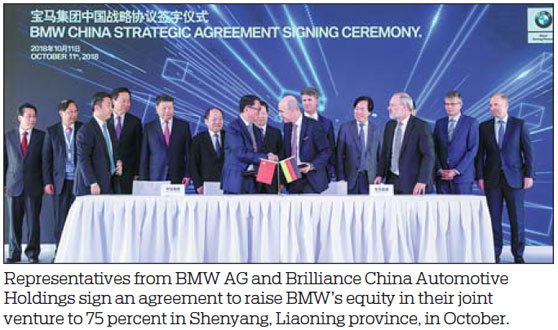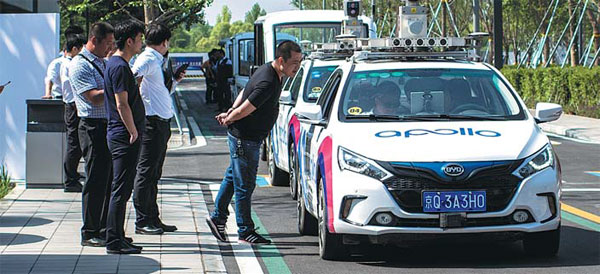China's top 10 auto industry stories, trends during 2018
|
Cars based on Baidu's Apollo autonomous driving platform conduct a road test in Xiongan New Area in Hebei province. Photos provided to China Daily |
Editor's note: China, the world's largest car market since 2009, has been rich in automotive developments, and 2018 has been no exception: from encouraging policies to lackluster sales, from massive takeovers to slashed tariffs, from exciting arrivals to sad departures. Here's a quick recap of top 10 automotive news stories China Daily has presented this year:
Geely buys Daimler stake
Zhejiang Geely Holding Group acquired a 9.69 percent stake in Daimler AG in February, becoming the largest shareholder of Mercedes-Benz's parent company. The Chinese carmaker acquired the stake valued at around $9 billion through an investment fund, according to a regulatory filing. Geely, one of the most successful carmakers in China, has been on a shopping spree. In December 2017, it became the biggest shareholder in Sweden's Volvo AB. In the same year, it acquired a 49.9 percent stake in Malaysian automaker Proton and bought flying car company Terrafugia Inc. Geely also owns Volvo Cars, which it purchased from Ford in 2010.
Self-driving rules released
China released a national guideline on road tests for self-driving vehicles in April, as part of a broader drive to accelerate the development of the technology and gain the advantage in commercializing such vehicles. The guideline, which took effect on May 1, allows local authorities to evaluate local conditions and arrange road tests for autonomous vehicles. China has been enthusiastic about the new technology. Local authorities in Beijing issued the nation's first guideline for road tests of autonomous vehicles in December 2017 and unveiled a closed testing ground for autonomous cars in February.
JV equity cap phasing out
China announced its plan in April to phase out the equity cap on automotive joint ventures by 2022, seen as one of the most far-reaching moves in the car industry. The 50 percent cap on foreign equity, put in place in 1994, was removed this year for companies that produce new energy vehicles and special-purpose vehicles. The National Development and Reform Commission, China's top economic planner, said the limits will be scrapped for commercial car producers in 2020 and for passenger car producers starting in 2022. Foreign carmakers will be allowed to have more than two Chinese joint ventures as well, beginning in 2022.
Audi to localize in second JV
Audi AG acquired in June a 1 percent stake in the joint venture between its parent company Volkswagen AG and China's SAIC Motor Corp, which marks an important step in its drive to localize vehicles with a second partner in the country. Audi and SAIC inked a deal to localize and sell Audi cars in China in late 2016. Equity ownership in a joint venture is a prerequisite for international carmakers to localize models in China, according to the country's industrial policies. Other shareholders are SAIC, which holds 50 percent; Volkswagen AG, 38 percent; Volkswagen Group China, 10 percent; and Skoda Auto, 1 percent.
China slashes car tariffs
China slashed import tariffs for automobiles and vehicle components starting July 1 as part of its efforts to further open up the market. Automobile tariffs - previously 20 percent to 25 percent - fell to 15 percent, and those for components - which ranged from 8 percent to 25 percent - fell to 6 percent. Following the news, carmakers have cut the prices of their imported models, benefiting the vast number of consumers in China and encouraging competition in the industry. In 2017, China imported 1.22 million vehicles, some 4.2 percent of total sales. Most of the imports were from the United States, Germany, Japan and the United Kingdom.
Tesla localizing on its own
Tesla Inc became the first international carmaker to localize production without a local partner in July, when it reached a deal with the Shanghai authorities to build a wholly owned plant in the city. The agreement came after China's announcement to remove the equity cap for the new energy car sector starting in 2018. The US carmaker secured a roughly 865,000-square-meter site in the suburban Lingang Area in Shanghai to build a plant that is expected to start partial production in 2019. The plant, with a designed annual capacity of 500,000 units, will produce the Model 3 sedan and the upcoming Model Y crossover in China, with the vehicles to be sold in China only.
Suzuki pulls out of China
Suzuki Motor Corp announced its decision in September to pull out of China after the carmaker known for its minicars failed to offer larger models that consumers favor in the world's largest vehicle market. The Japanese carmaker agreed to transfer its 50 percent stake in Changan Suzuki, its last remaining Chinese venture, to Chongqing Changan Automobile Co for 1 yuan (14.5 US cents). Established in 1993, Changan Suzuki was one of China's first car manufacturing joint ventures. Suzuki's withdrawal from Changan Suzuki came after it left another Chinese joint venture in June, Jiangxi Changhe Suzuki Automobile Co, which was established in 1994.
BMW takes major stake in JV
BMW AG announced in October that it had inked an agreement with Brilliance China Automotive Holdings to raise its equity in their joint venture to 75 percent from the current 50 percent. The move will make BMW the first international carmaker to have a majority stake in its joint ventures in China. The transaction, which is valued at 29 billion yuan ($4.2 billion), is expected to be completed when the Chinese authorities remove limits on foreign ownership in passenger car joint ventures in 2022.
Domestic vehicle sales off
Car sales in China are expected to fall for the first time since 1990, after vehicle deliveries fell 13.86 percent year-on-year in November, which marked the fifth consecutive month of decline. Total vehicle sales in the first 11 months of 2018 stood at 25.42 million, a decline of 1.65 percent year-on-year. The China Association of Automobile Manufacturers expect whole year sales to fall 3 percent from 2017 and said the situation will not turn better in 2019 due to slowing economic growth and poor confidence in consumption. Sales of new energy vehicles, however, soared to a new high, with their deliveries exceeding 1 million by the end of November.
Gasoline car capacity curbed
China issued a guideline in December, banning the establishment of any new company that produces only conventionally fueled vehicles, including hybrids and plug-in hybrids. The guideline also raises the bar for electric carmakers, stipulating that such plants must be located in provinces that boast a more competitive manufacturing basis and have more new energy vehicles on their roads than the country's average. The authorities had also decided to streamline the procedure, with the longstanding checking and ratifying for approval replaced with filing for records or registration. The guideline is scheduled to come into effect on Jan 10.

(China Daily 12/24/2018 page18)















